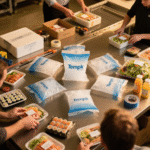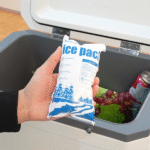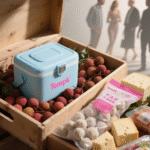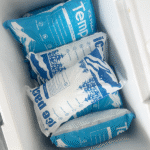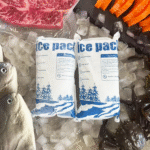Cold Chain Warehousing: Why It’s Essential for Safe and Efficient Temperature-Controlled Storage
Cold chain warehousing plays a crucial role in ensuring that temperature-sensitive products, comme les produits pharmaceutiques, vaccins, and fresh food, remain within safe temperature ranges throughout the supply chain. Dans cet article, we will explore the importance of cold chain warehousing, its key components, and why it is indispensable for industries that require precise temperature control.
-
What is cold chain warehousing, and why is it critical for temperature-sensitive products?
-
What are the essential features of an effective cold chain warehouse?
-
How does cold chain warehousing impact industries like pharmaceuticals and food transportation?
-
What are the latest trends in cold chain warehousing for 2025?
What is Cold Chain Warehousing, and Why is it Critical for Temperature-Sensitive Products?
Cold chain warehousing refers to the storage of products that require a controlled temperature environment to maintain their quality and safety. This type of warehousing is essential for industries like pharmaceuticals, nourriture, et biopharmaceutique, where even slight temperature deviations can compromise product integrity.
Why is cold chain warehousing so important?
The primary reason is the need to preserve the efficacy of temperature-sensitive goods. Par exemple, vaccines need to remain within a specific temperature range to retain their effectiveness. De la même manière, perishable food items must be stored at consistent temperatures to prevent spoilage and maintain nutritional value.
Exemple: A pharmaceutical company relies on cold chain warehousing to ensure that vaccines stored for distribution maintain their potency. A deviation in temperature could render the vaccine ineffective, resulting in significant health and financial consequences.
Key Features of a Cold Chain Warehouse
Cold chain warehouses are equipped with specialized infrastructure to monitor and maintain temperatures across various storage areas. Some key features include:
-
Temperature-controlled rooms: These are divided into different temperature zones, each tailored for specific types of products.
-
Surveillance de la température en temps réel: Continuous monitoring ensures that temperatures stay within safe ranges, with alerts for any deviations.
-
Energy-efficient cooling systems: Cold chain warehouses often use advanced refrigeration systems that reduce energy consumption while maintaining precise temperatures.
-
Automated inventory management: Helps ensure that products are stored and moved efficiently, minimizing human error.
| Fonctionnalité | Description | Benefits for Users |
|---|---|---|
| Zones de température | Different sections for different temperature needs | Ensures product-specific temperature control |
| Surveillance en temps réel | Continuous temperature tracking | Immediate alerts in case of temperature deviation |
| Energy-efficient Systems | Low-energy cooling systems | Cost savings and reduced environmental impact |
Practical Tips for Cold Chain Warehouse Operators
-
Maintain regular checks on refrigeration systems: Frequent maintenance ensures that cooling units operate optimally, preventing costly failures.
-
Invest in advanced temperature monitoring devices: Ces systèmes fournissent des données en temps réel, enabling quick action to mitigate any risks.
Exemple du monde réel: A global food distributor utilizes temperature-controlled warehousing to ensure that its frozen seafood maintains peak freshness, improving customer satisfaction and reducing waste.
How Does Cold Chain Warehousing Impact Industries Like Pharmaceuticals and Food?
Cold chain warehousing has a direct impact on sectors that rely on the integrity of temperature-sensitive products.
Industrie pharmaceutique
Produits pharmaceutiques, surtout les vaccins, biologique, and temperature-sensitive drugs, require stringent temperature control. Cold chain warehousing ensures that these products are stored and transported without compromising their effectiveness.
Benefits to the Pharmaceutical Industry:
-
Safety and efficacy: Ensures that medications, surtout les vaccins, remain viable, preventing patient health risks.
-
Conformité réglementaire: Many countries have strict regulations regarding the storage of pharmaceuticals, which cold chain warehousing helps meet.
Industrie alimentaire
Dans l'industrie alimentaire, cold chain warehousing preserves the freshness and quality of perishable items, from fresh fruits and vegetables to meats and dairy products.
Benefits to the Food Industry:
-
Durée de conservation prolongée: Maintaining appropriate temperatures helps reduce spoilage and waste.
-
Consumer safety: Prevents contamination from improper storage temperatures, ensuring that food remains safe for consumption.
How Has Cold Chain Warehousing Evolved for 2025?
As the demand for temperature-sensitive products continues to rise, cold chain warehousing is evolving with the latest technological advancements to improve efficiency and reliability.
Latest Developments in Cold Chain Warehousing
-
IoT et capteurs intelligents: Real-time monitoring is becoming more advanced with IoT devices that provide precise, location-based temperature tracking. These smart sensors also help predict potential failures, enabling proactive measures.
-
Blockchain pour la transparence: Blockchain technology is increasingly being used to ensure the security and transparency of the cold chain process. This allows stakeholders to track the product’s journey from warehouse to end-user, ensuring integrity.
Insistance au marché:
Dans 2025, cold chain warehouses will increasingly integrate AI-driven predictive analytics to optimize operations. These advancements will reduce costs and improve overall supply chain efficiency by anticipating temperature fluctuations and adjusting conditions accordingly.
FAQ
What are the key benefits of cold chain warehousing for the pharmaceutical industry?
Cold chain warehousing ensures that temperature-sensitive pharmaceutical products, comme les vaccins, remain effective and compliant with regulatory standards, safeguarding both public health and product quality.
How do cold chain warehouses help preserve food safety?
Cold chain warehouses maintain food products at the correct temperature, Empêcher la détérioration, contamination, and loss of quality, thus extending shelf life and ensuring consumer safety.
Conseils récapitulatifs et exploitables
Résumé:
Cold chain warehousing is a critical component of the logistics industry, especially for sectors like pharmaceuticals and food. As temperaturesensitive goods increase, adopting advanced technology and energy-efficient systems will become more important. Dans 2025, the industry is expected to continue evolving with innovations in IoT, IA, et blockchain, Amélioration de l'efficacité et de la fiabilité.
Conseils exploitables:
-
Invest in temperature monitoring systems and energy-efficient cooling solutions to ensure compliance and minimize operational costs.
-
Stay updated with the latest trends in cold chain technology to improve service offerings and enhance the customer experience.
À propos du tempk
Company Overview:
Tempk est spécialisé dans la fourniture de solutions avancées pour la chaîne du froid, offering state-of-the-art temperature-controlled warehousing and real-time monitoring for the pharmaceutical, nourriture, and biopharma industries. Our services ensure the safe and efficient transportation and storage of your valuable temperature-sensitive goods.
Prochaine étape:
Contact us today to learn how our cold chain solutions can help your business stay ahead in 2025

















